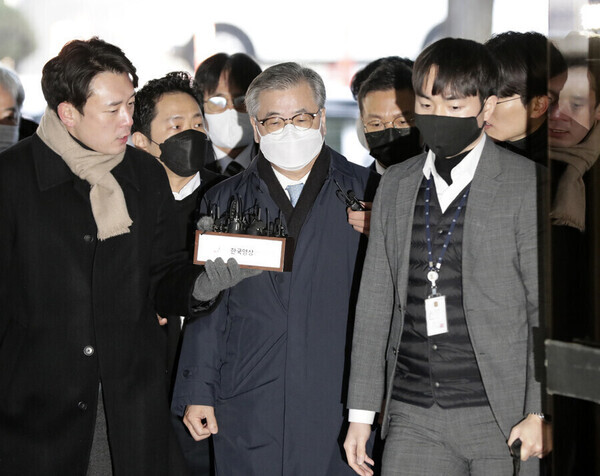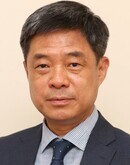hankyoreh
Links to other country sites 다른 나라 사이트 링크
[Column] Former security advisor’s arrest is culmination of 30 years of Seoul’s empty diplomacy


By Baek Ki-chul, executive editor
Last week’s arrest and indictment of Suh Hoon, former Blue House national security advisor, came as a shock. Although two former government officials suspected of involvement in the Moon administration’s response to North Korea’s shooting of a South Korean official in the waters off the western coast were detained and subsequently released on habeas corpus review, the prosecution indicted Suh without reviewing legality. Important diplomatic and security measures are being dealt with by a few prosecutors and justices from the warrant division — something that is, frankly, embarrassing.
Even though it would be unwise to come to hasty conclusions, if we look at the charges made against Suh through warrants and such, one cannot help but wonder if these charges should be dealt with in a court of law.
Was the fisheries official defecting to the North? Did the government systematically choose to conceal the fact of his murder? These questions should be answered by the political judgment of diplomatic and security personnel, as they should comprehensively consider the intelligence on North Korea and inter-Korean channels at the time. It is not something that one can apply the law to indiscriminately.
Is the arrest of the former national security advisor simply a case that concerns the punishment of Suh Hoon as an individual? The prosecution is accusing Suh of masterminding a cover-up and accusing him of corruption, but incidents related to North Korea are not that simple. You can sway the way in which judgments are made, but it is not something one can do alone. Ultimately, we must see Suh’s arrest for what it is: a direct punishment of the Moon Jae-in administration’s North Korea policies.
Suh Hoon’s arrest basically signifies us throwing dirt in our own diplomacy. Where else can you see an entire country, after switching to a new administration, trampling on its North Korea expert adept at orchestrating inter-Korean conversations who had also gained the trust of US-Japan allies?
Some claim that it is unfair for certain parties to be so angry at the arrest of Suh, as the Moon administration also arrested former Minister of Defense Kim Kwan-jin. While that argument has some merits, there’s fallacy at work there as well. Kim was judged guilty, not because of North Korean issues, but for his connection with the “comment squad” accused of election meddling. However, seeing as he was a military expert that North Korea was most wary of during the Park Geun-hye administration, his arrest can also be seen as a loss of a diplomatic and security asset.
The attempts to put the Blue House’s national security advisor, head of the National Intelligence Service, and the minister of defense in jail, which happen whenever there is a change of administration, shows why our diplomatic measures have failed for the last 30 odd years. The arrest of Suh is a symbolic event that symbolizes 30 years of empty-handed diplomacy.
During the last 30 years, others have sought unity and peace, but we have squandered that time in the pain of division and the threat of war. This is because we’ve been so busy fighting tooth and nail among ourselves, hindering each other by clinging to each other’s faults. North Korea’s outlandish nuclear brinkmanship and America’s stubbornness and unreliability are also factors that should be considered, but Seoul’s own capabilities were far from sufficient.
Germany achieved the great task of reunification by walking a different path from Korea. The lesson we can learn from German unification is that it steadily prepared for that serendipitous time in the immediate wake of the Cold War. They did not rush to prepare for reunification right before and after the reunification of East and West Germany in 1989-1990.
The corner of German unification is “thesis – antithesis - synthesis diplomacy.” Konrad Adenauer’s “power policy,” namely, the focus on the West, the disapproval of the East, and the focus on economic reconstruction formed strong foundations for the country. Willy Brandt’s Ostpolitik didn’t break down the pro-Western stance, but reconciled and communicated with the Soviet Union, East Germany and East Europe based on a peace regime.
After Brandt, the Christian Democratic Party virtually gave up on immediate unification and continued to coexist in peace. Paradoxically, the fact that the Social Democratic Party and the Christian Democratic Party decided to give up on rapid unification and sought to coexist became the foundation for reunification.
The world is changing drastically. The orders in Northeast Asia and the world are faltering as the US and China continue their confrontation, the war rages on in Ukraine, and North Korea completes its nuclear weapons program. There is a great shift happening in world diplomacy, but what are we doing?
It is time for Korea to reset the diplomacy that has failed us for 30 years. It is said that conservative administrations have more leeway when it comes to transforming foreign policy, and that certainly has been the expectation of the current Yoon Suk-yeol government. The US underwent many big changes under Nixon, and we also had a big change in diplomacy while Roh Tae-woo was at the helm. It is time to overcome the mistakes of both conservative and liberal governments that have accumulated over the past 30 years.
However, the fact that the minister of unification spearheaded the push for a probe into the Moon administration’s response to the fisheries official’s death and urged that punishments be meted out to the relevant parties makes me tilt my head in wonder. Yoon’s diplomatic policies with the US and Japan have been brought to light, and any attempts to exist peacefully with North Korea have been berated as being “pro-North Korea.” This is pathetic and worrying.
The opposition parties, including the Democratic Party of Korea, are still hanging on to their old repertoire while thinking about political diplomacy towards North Korea, China and Japan. China has changed greatly, and North Korea is openly targeting its South Korean compatriots with nuclear weapons. We cannot stay hostile toward Japan forever. Now that the diplomatic landscape is changing fundamentally, it is necessary to abandon what needs to be discarded and adopt new schemas.
Much like Germany, we need to inherit the diplomacy of Syngman Rhee, Park Chung-hee, Kim Dae-jung, and Roh Moo-hyun by thesis antithesis and synthesis. Only by doing so can our diplomacy turn a new leaf. The least we can do is break away from amateur-like behavior by refraining from recklessly trying to punish diplomatic and security figures of the former administration each time a new president takes office.
Please direct questions or comments to [english@hani.co.kr]

Editorial・opinion
![[Column] Is Korean democracy really regressing? [Column] Is Korean democracy really regressing?](https://flexible.img.hani.co.kr/flexible/normal/500/300/imgdb/original/2024/0705/2917201664129137.jpg) [Column] Is Korean democracy really regressing?
[Column] Is Korean democracy really regressing?![[Column] How tragedy pervades weak links in Korean labor [Column] How tragedy pervades weak links in Korean labor](https://flexible.img.hani.co.kr/flexible/normal/500/300/imgdb/original/2024/0703/8717199957128458.jpg) [Column] How tragedy pervades weak links in Korean labor
[Column] How tragedy pervades weak links in Korean labor- [Column] How opposing war became a far-right policy
- [Editorial] Korea needs to adjust diplomatic course in preparation for a Trump comeback
- [Editorial] Silence won’t save Yoon
- [Column] The miscalculations that started the Korean War mustn’t be repeated
- [Correspondent’s column] China-Europe relations tested once more by EV war
- [Correspondent’s column] Who really created the new ‘axis of evil’?
- [Editorial] Exploiting foreign domestic workers won’t solve Korea’s birth rate problem
- [Column] Kim and Putin’s new world order
Most viewed articles
- 110 days of torture: Korean mental patient’s restraints only removed after death
- 2Former bodyguard’s dark tale of marriage to Samsung royalty
- 3Real-life heroes of “A Taxi Driver” pass away without having reunited
- 4[Column] Is Korean democracy really regressing?
- 5Koreans are getting taller, but half of Korean men are now considered obese
- 6Months after outcry over “torture devices,” Justice Ministry proposes more restraints for immigratio
- 7Foreign day laborers make up majority of death toll in Korean battery factory fire
- 8[Editorial] Exploiting foreign domestic workers won’t solve Korea’s birth rate problem
- 9[Column] How tragedy pervades weak links in Korean labor
- 10Around 2 mil. Koreans conscripted to labor from 1939 to 1945